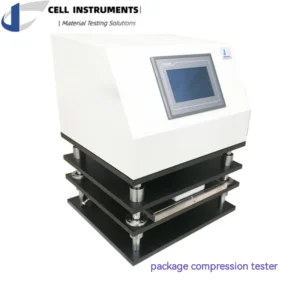Packaging Testing Equipment
In today’s high-demand industries, packaging testing equipment is essential for ensuring that flexible and rigid packaging can withstand mechanical stresses during storage, transport, and handling. As global supply chains become increasingly complex, the ability to validate packaging strength and integrity is not only a matter of quality control but also one of safety and compliance.
Cell Instruments provides advanced, user-friendly packaging testing solutions such as the Package Compression Tester, designed to meet the exacting requirements of the pharmaceutical, medical device, food, cosmetics, and electronics industries. These instruments are used widely for evaluating composite film bags, infusion packaging, rigid containers, and more.
Composite Film Bag Compression Resistance Measurement: Why It Matters
With the rise of lightweight and eco-friendly packaging, composite film bags are being used more than ever in packaging medicines, beverages, and daily-use chemicals. However, these materials must still perform under load and maintain their barrier properties when exposed to pressure.
Composite film bag compression resistance measurement refers to the test method that evaluates a film pouch’s ability to resist deformation or rupture when subjected to vertical or stacking forces. Using precision packaging testing equipment, professionals can simulate real-world stress scenarios such as shipping impacts or long-term shelf stacking.
Key metrics include:
- Maximum force before deformation
- Constant pressure endurance over time
- Seal and structure integrity after testing
By using the Cell Instruments Package Compression Tester, test operators can apply pressure at controlled speeds and gather real-time force data. Accurate results help in material comparison, design validation, and compliance testing, enabling packaging engineers to optimize both structure and cost-efficiency.
Infusion Packaging Pressure Strength Tester: Safe Delivery of Critical Medications
Infusion packaging, such as IV bags and flexible pharmaceutical pouches, must meet strict requirements to avoid leakage or rupture during transport and clinical use. That’s why the infusion packaging pressure strength tester plays a vital role in validating the pressure-bearing capability of such medical packaging.
A standard testing process involves:
- Placing a filled or empty infusion package between two compression plates.
- Applying downward force using a pre-calibrated load.
- Measuring the failure point, whether it’s film rupture or seal breakage.
To simulate these conditions accurately, the Package Compression Tester from Cell Instruments incorporates:
- High-sensitivity sensors (1% FS accuracy)
- Flat, precision-ground platens (≤ Ra 3.2 μm)
- Test speeds adjustable to <5 mm/min for soft materials
- Liquid collection trays to prevent contamination upon rupture
This ensures reliable, repeatable data while protecting both the operator and the test environment. For quality assurance teams in hospitals, IV manufacturers, or pharma logistics, a failure in testing could indicate a real-life patient safety hazard, making these tests not just important but essential.
Key Features That Set Cell Instruments Apart
Cell Instruments’ packaging testing equipment combines advanced technology and ergonomic design. The Package Compression Tester is developed in line with global standards such as ISO 12048, ASTM D642, and other related test protocols.
Highlighted features include:
- HMI touch screen for intuitive parameter setup and test execution
- Industrial PLC control system for high test stability
- Dual testing modes: bursting strength & constant pressure
- Automatic pressure compensation to ensure steady loading
- Built-in statistical analysis tools
- Optional RS232 and software integration for lab data workflows
- Custom platen sizes (≥250 mm × 300 mm) for various package formats
Whether you’re testing paper bowls, ice packs, infusion bags, or composite pouches, the system adapts seamlessly.
How to Run a Professional Compression Resistance Test
When performing compression resistance tests, both procedural precision and equipment capability matter.
Step-by-step overview:
- Condition the sample: Store at 23 ±2°C and 50 ±5% RH for at least 24 hours
- Place the sample: Align it centrally on the platen without wrinkles
- Start the test: Load the sample at a predefined speed
- Observe the behavior: Track deformation, rupture, and sealing failure
- Analyze the data: Review force-time or force-deformation curves for insights
Each test can be customized depending on the application scenario, such as:
- Simulating vertical stacking
- Short-term compression bursts
- Long-term load sustainability
With automated data collection and digital output, users can ensure consistency across multiple test runs, a key requirement in third-party certification or production quality audits.
Conclusion: Smarter Testing for Stronger Packaging
As packaging demands evolve, so does the need for advanced packaging testing equipment that delivers accurate, efficient, and compliant results. From composite film bag compression resistance measurement to infusion packaging pressure strength tests, these evaluations help ensure that packaging does more than look good — it protects what matters most.
Cell Instruments is proud to support packaging professionals with dependable, high-precision solutions that improve product quality, reduce failure rates, and ensure compliance with global standards.
Let our Package Compression Tester be your trusted tool in building safer, smarter, and stronger packaging.

